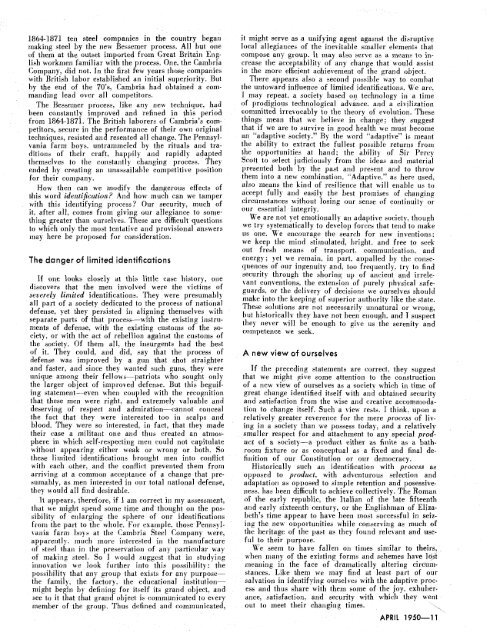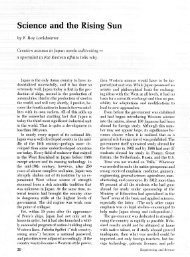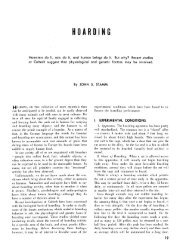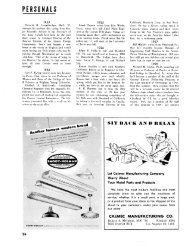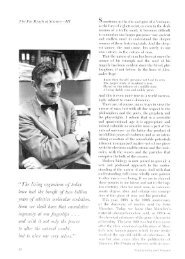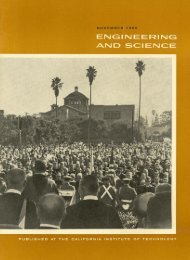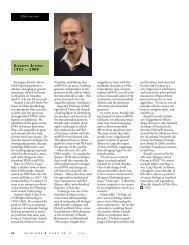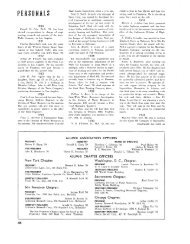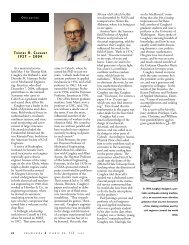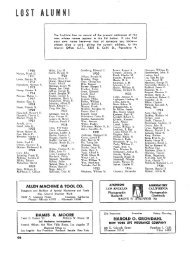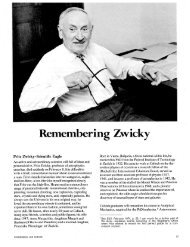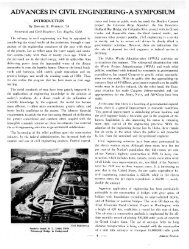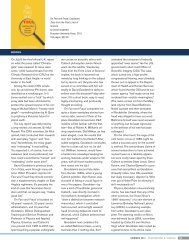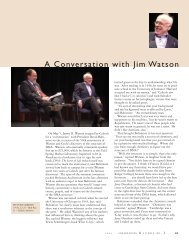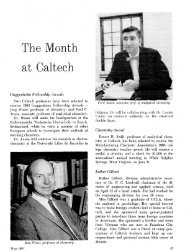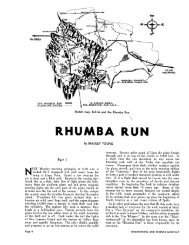T - Engineering & Science - California Institute of Technology
T - Engineering & Science - California Institute of Technology
T - Engineering & Science - California Institute of Technology
Create successful ePaper yourself
Turn your PDF publications into a flip-book with our unique Google optimized e-Paper software.
1864-1871 ten steel companies in the country began<br />
making steel by the new Bessemer process. All but one<br />
<strong>of</strong> them at the outset imported from Great Britain Eng<br />
lish workmen familiar with the process. One, the Cambria<br />
Con~pany, did not. In the first few years those companies<br />
with British labor established an initial superiority. But<br />
by the end <strong>of</strong> the 707s, Cambria had obtained a com-<br />
manding lead over all competitors.<br />
The Bebsemer process, like any new technique. had<br />
been constantly improved and refined in this period<br />
from 1864-1871. The British laborers <strong>of</strong> Cambria's com-<br />
petitors, secure in the performance <strong>of</strong> their own original<br />
techniques, resisted and resented all change. The Pennsyl-<br />
\ania farm boys. untrammeled by the rituals and tra-<br />
ditions <strong>of</strong> their craft, happily and rapidly adapted<br />
themselves to the constantl~ changing process. They<br />
ended by creating an unavailable con~petitixe position<br />
for their company.<br />
How then can we modify the dangerous effects <strong>of</strong><br />
this word identification? And how much can we tamper<br />
with this identifying process? Our security. much <strong>of</strong><br />
it. after all. comes from giving our allegiance to some-<br />
thing greater than ourselves. These are difficult questions<br />
to which only the most tentative and provisional answers<br />
may here be proposed for consideration.<br />
The danger <strong>of</strong> limited identifications<br />
If one looks clobely at this little case history, one<br />
discovers that the men involved were the victims <strong>of</strong><br />
severely limited identifications. They were presumably<br />
all part <strong>of</strong> a society dedicated to the process <strong>of</strong> national<br />
defense, yet they persisted in aligning then~selves with<br />
separate parts <strong>of</strong> that process-with the existing instru-<br />
ments <strong>of</strong> defense, with the existing customs <strong>of</strong> the so-<br />
ciety. or with the act <strong>of</strong> rebellion against the customs <strong>of</strong><br />
the society. Of them all. the insurgents had the best<br />
<strong>of</strong> it. They could, and did. say that the process <strong>of</strong><br />
defense was improved by a gun that shot straighter<br />
and faster, and since they wanted such guns. they were<br />
unique among their fellow;.-patriots who sought only<br />
the larger object <strong>of</strong> improved defense. But this beguil-<br />
ing statement-even when coupled with the recognition<br />
that these men were right. and extremely valuable and<br />
deserving <strong>of</strong> respect and admiration-cannot conceal<br />
the fact that they were interested too in scalps and<br />
blood. They were so interested. in fact, that the) made<br />
their case a militant one and thus created an atrnos-<br />
phere in wbich self-respecting men could not capitulate<br />
without appearing either weak or wrong or both. So<br />
these limited identifications brought men into conflict<br />
with each other, and the conflict prevented them from<br />
arriving at a common acceptance <strong>of</strong> a change that pre-<br />
i-umably. as men interested in our total national defense,<br />
they would all find desirable.<br />
It appears. therefore, if 1 am correct in rny absessinent,<br />
that we might spend some time and thought on the pas-<br />
sibility <strong>of</strong> enlarging the sphere <strong>of</strong> our identifications<br />
from the part to the whole. For example. those Peniis)l-<br />
lank farm boys at the Cambria Steel Company were,<br />
apparent!), much more interested in the manufacture<br />
<strong>of</strong> steel than in the preservation <strong>of</strong> an) particular way<br />
<strong>of</strong> making .steel. So I would euggest that in studyirig<br />
innovation we look further into this possihilitj: the<br />
possibility that any group that exists for any purpose-<br />
the family. the factory- the educational institution-<br />
might begin by defining for itself its grand object. and<br />
see to it that that grand object is communicated to etery<br />
member <strong>of</strong> the group. Thus defined and communicated,<br />
it might serve as a unifying agent against the dibruptive<br />
local allegiances <strong>of</strong> the inevitable smaller elements that<br />
compose an? group. It may also sene as a means' to in-<br />
crease the acceptability <strong>of</strong> any change that would assisi<br />
in the more efficient achievement <strong>of</strong> the grand object.<br />
There appears also a i-econd possible way to combat<br />
the untoward influence <strong>of</strong> limited identifications. We arc.<br />
1 may repeat, a society based on technology in a time<br />
<strong>of</strong> prodigious technological advance. and a civilization<br />
committed irrevocably to the theory <strong>of</strong> evolution. These<br />
things mean that we believe in change; they suggesi<br />
that if we are to survive in good health we must become<br />
an "adaptive society." By the word '"adaptive" is meant<br />
the ability to extract the fullest possible returns from<br />
the opportunities at hand; the ability <strong>of</strong> Sir Percy<br />
Scott to select judiciously from the ideas and material<br />
presented both Ijy the past and present and to throw<br />
them into a new combination. "Adaptive." ai- here used,<br />
also means the kind <strong>of</strong> resilience that will enable us to<br />
accept fully and easily the best promises <strong>of</strong> changing<br />
circumstances without losing our sense <strong>of</strong> continuity or<br />
our essential integriy.<br />
We are not yet emotionally an adaptive society. though<br />
we try systematically to develop forces that tend to make<br />
ui; one. Be encourage the search for new inventions:<br />
we keep the mind stimulated. bright. and free to seek<br />
out fre;.h means <strong>of</strong> transport. communication. and<br />
energy ; yet we remain, in part. appalled by the conse-<br />
quences <strong>of</strong> our ingenuity and, too frequeiitl). try to find<br />
security through the shoring up <strong>of</strong> ancient and irrele-<br />
v ant conventions. the extension <strong>of</strong> pure1 y physical safe-<br />
guards. or the delivery <strong>of</strong> decisions we ourselves should<br />
make into the keeping <strong>of</strong> superior authority like the state.<br />
These solutions are not necessarily unnatural or wrong,<br />
but historically they have not been enough. and I suspect<br />
they never will be enough to gjxe us the serenity and<br />
competence we seek.<br />
A new view <strong>of</strong> ourselves<br />
If the preceding statements are correct. they suggest<br />
that we might give some attention to the construction<br />
<strong>of</strong> a new view <strong>of</strong> ourselves as a society which in time <strong>of</strong><br />
great change identified itself with and obtained security<br />
and satisfaction from the wise and creative accomrnodation<br />
to change itself. Such a view rests. 1 think. upon a<br />
relatively greater reverence for the mere process <strong>of</strong> living<br />
in a society than we possess today. and a relatively<br />
smaller respect for and attachment to any special product<br />
<strong>of</strong> a society -a ~roduct either as finite as a bathroom<br />
fixture or as conceptual as a fixed and final definition<br />
<strong>of</strong> our Constitution or our democracy.<br />
Historically such an identification with process as<br />
opposed to product, with adventurous selection and<br />
adaptation as opposed to simple retention and pobessiveness.<br />
has been difficult to achieve collectively. The Roman<br />
<strong>of</strong> the early republic. the Italian <strong>of</strong> the late fifteenth<br />
and early sixteenth century. or the Englishman <strong>of</strong> Elizabeth's<br />
time appear to have been most successful in seizing<br />
the new o~portunities while conserving as much <strong>of</strong><br />
the heritage <strong>of</strong> the past as they found relevant and useful<br />
to their purpose.<br />
We seem to have fallen on times similar to theirs,<br />
when many <strong>of</strong> the existing forms and schemes have lost<br />
meaning in the face <strong>of</strong> dramatically altering circumdances.<br />
Like them we may find at least part <strong>of</strong> our<br />
salvation in identifying ourselves with the adaptive process<br />
and thus share with them some <strong>of</strong> the joy. exhuberance.<br />
satisfaction, and security with which they<br />
out to meet their changing times.<br />
APRIL 1950-1 1


